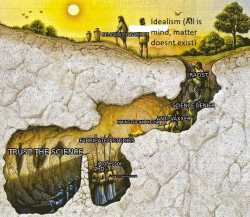[14 / 4 / ?]
Quoted By: >>21725070 >>21725072 >>21725073 >>21725074 >>21725075 >>21725081
Proving Atheism False:
To prove atheism false, we must show that the claim "there is no God" cannot be reasonably sustained. Here are several arguments against atheism:
Causality Argument: The principle of sufficient reason suggests that everything that exists must have a cause. The universe itself must have had a cause, something outside itself that began its existence. Atheism fails to offer a satisfactory cause for the universe that is coherent without invoking some form of theism.
Complexity and Design: The fine-tuning of the universe and the intricacy of life points to intentional design. The existence of life, the laws of physics, and the conditions necessary for the universe to exist in such an orderly way strongly suggest a designer. Atheism struggles to account for this complexity without invoking a purposeful creator.
Moral Argument: Objective morality presupposes a moral lawgiver. Atheism struggles to explain how objective moral values can exist without a transcendent being who grounds those values. If moral truths are objective and binding, they imply the existence of a higher moral authority, which atheism cannot account for.
The Problem of Knowledge: Atheism cannot fully explain how human beings can have knowledge of objective truths if all that exists is material. Theism provides a coherent explanation for our ability to understand abstract truths, beauty, morality, and logic, which atheism cannot satisfactorily justify.
If atheism cannot provide satisfactory answers to these fundamental questions about the origins of the universe, the nature of morality, and the source of knowledge, then it is reasonable to conclude that atheism is false. Therefore, by the Law of Excluded Middle, if atheism is false, theism must be true.
To prove atheism false, we must show that the claim "there is no God" cannot be reasonably sustained. Here are several arguments against atheism:
Causality Argument: The principle of sufficient reason suggests that everything that exists must have a cause. The universe itself must have had a cause, something outside itself that began its existence. Atheism fails to offer a satisfactory cause for the universe that is coherent without invoking some form of theism.
Complexity and Design: The fine-tuning of the universe and the intricacy of life points to intentional design. The existence of life, the laws of physics, and the conditions necessary for the universe to exist in such an orderly way strongly suggest a designer. Atheism struggles to account for this complexity without invoking a purposeful creator.
Moral Argument: Objective morality presupposes a moral lawgiver. Atheism struggles to explain how objective moral values can exist without a transcendent being who grounds those values. If moral truths are objective and binding, they imply the existence of a higher moral authority, which atheism cannot account for.
The Problem of Knowledge: Atheism cannot fully explain how human beings can have knowledge of objective truths if all that exists is material. Theism provides a coherent explanation for our ability to understand abstract truths, beauty, morality, and logic, which atheism cannot satisfactorily justify.
If atheism cannot provide satisfactory answers to these fundamental questions about the origins of the universe, the nature of morality, and the source of knowledge, then it is reasonable to conclude that atheism is false. Therefore, by the Law of Excluded Middle, if atheism is false, theism must be true.

